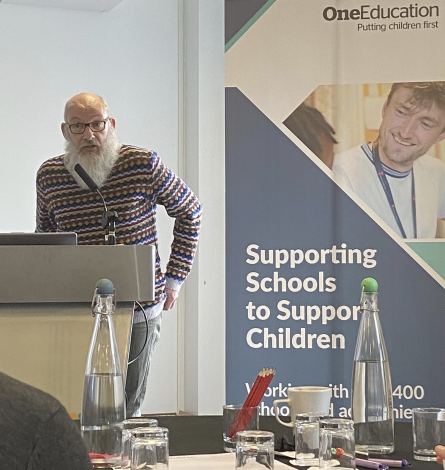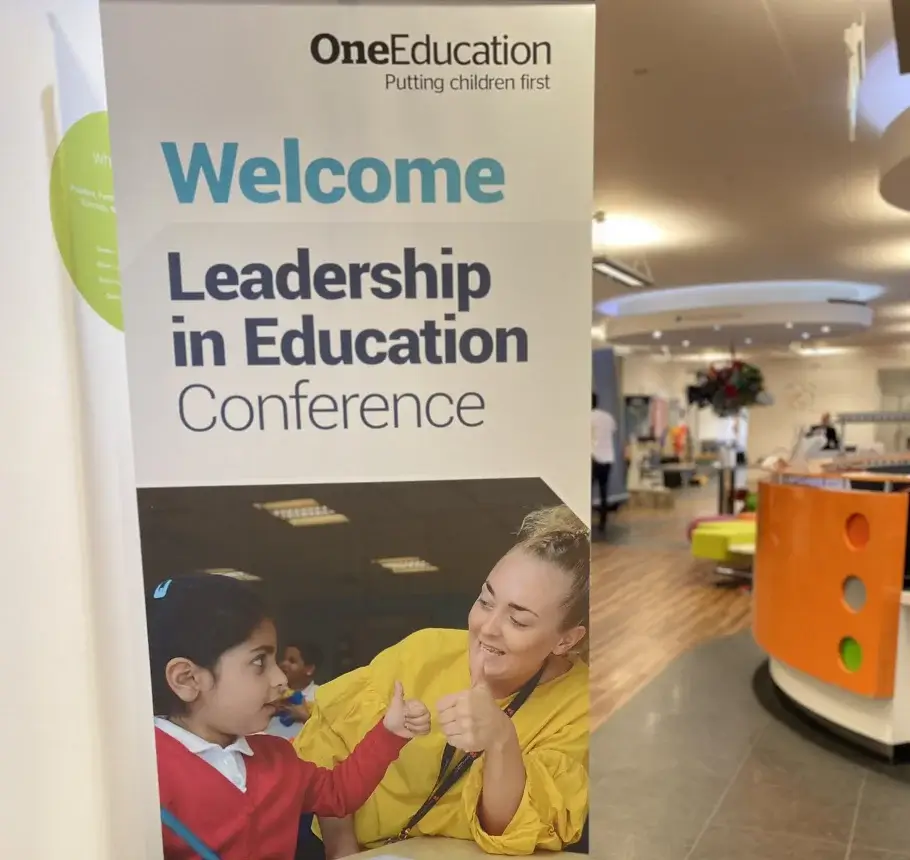Welcome
On Thursday 27 April 2023, delegates arrived at The Studio in Manchester, looking forward to what was set to be an incredible day. Jo Gray, One Education’s Head of Educational Development, welcomed us to the event and reflected on our theme, The Future of Education: Academies, Schools and Childhood.
The education system as we know it today can trace its roots back to the industrial revolution. Over the years, we have learned that we must be ready to embrace change in order to meet the changing needs of our pupils.
In the wake of teachers’ strikes and the tragic death of Ruth Perry, we understand there is a growing sense of apathy across the sector. But #LeadConf23 is about reminding ourselves of the huge potential within our school leadership teams and restoring our faith in the future of education.
By working together to act as agents of change, we can continue to transform the lives of children and young people.
Greg Bottrill – Must Childhood Become a Lost Word?
Our first keynote was delivered by Greg Bottrill, best-selling author and Early Years consultant. Greg began by asking us to think about our own childhoods, sparking happy memories and nostalgic chatter. But then he followed with the question, when does childhood end? Delegates each gave the same answer: never. Even now, as adults and as teachers, they still want to have fun! With this in mind, Greg encouraged us to think about how we can bring joy into our classrooms. He shared the different schemas of play identified by Jean Piaget, including enveloping, orientation, transportation and others. Whilst some of these behaviours can often seem nonsensical, they are crucial to the way children learn about the world. Greg challenged us to think about where we see these schemas in action. Can they be found in all our classrooms, or just in Early Years? If so, how long can we say childhood lasts for our pupils? Greg shared many toolkits that leaders can take back to school with them, ensuring children can continue to learn through play and take on new adventures.

“It’s great to be here today to talk about the importance of childhood, asking heads if that’s something they believe in and, if so, what is our responsibility to children? By supporting pupils’ play and autonomy, education can be something we do with children, rather than something done to them.”
Coming Up For Air: Making Reading Deep Dives Work for You
After a fantastic start, delegates headed off to their first workshop of the day. I joined a workshop led by Simone Nixon, Lead Practitioner in Literacy, to learn how leaders can carry out purposeful internal deep dives and use their findings to transform their schools’ reading offer. Using Holden Clough Primary as a case study, Simone shared many ideas on how to successfully build a reading culture within school, from book clubs, wishlists and assemblies to inventive classroom displays. With fresh new insights on how to support staff, pupils and parents, delegates left with lots of ideas to prepare for their next deep dive.
For further support with Reading deep dives, school leaders can receive expert advice and guidance with the One Education Reading Award. We can offer in-school or remote support, reflecting the needs of your setting. Take a look at our Reading Award page to find out more.
SEND: The Way Forward
Following a quick coffee break and a chance to chat to exhibitors, we gathered together for our next workshop. Jenny Garside, Lead Practitioner in SEND, spoke to us about the importance of putting SEND at the centre of school life. We discussed how an inclusive approach is often beneficial for all learners, not just those with SEND. Plus, it can help staff by saving on time, money and workload. To achieve this, Jenny explained the ways we can invest in the SEND team, not only by offering training, but ensuring they have the time they need to carry out their role, and a place among the senior leadership team to affect positive change. Working together, delegates enjoyed thinking of new ways we can heighten SEND visibility in school, blend SEND with pedagogy decisions, and effectively bridge the gap between academic and pastoral teams.
Sufiya Ahmed – The Future of Diversity in Education: Do we understand our shared history?
Our second keynote was delivered by Sufiya Ahmed, award-winning children’s author. Sufiya began by reflecting on her own childhood; how she found refuge in the local library and dreamt of writing her own stories. Critically, she spoke about the importance of diversity and representation in literature. Drawing from her own experience, and those of the young people she has worked with, she explained that children need to see themselves reflected in literature to know that they belong in stories – and that they might have their own story to tell. But it is not just children from ethnic minority backgrounds who will benefit. In fact, all children stand to gain a greater understanding of our history, as they read about the contributions people of colour have made to Britain over the centuries. From the war effort to the suffrage movement, children can enjoy learning about the history we share.

“It’s been a pleasure to take part in the conference today, talking about the need for inclusive books in the classroom. By reflecting on 500 years of our shared history, we can help to encourage a sense of acceptance and belonging for people of colour, and recognise the contributions they have made to society.“
Olivia Taylor – Achieve Better: Supporting children from underserved (or disadvantaged) backgrounds
Delegates enjoyed a fabulous lunch, followed by an inspirational keynote by Olivia Taylor. Coming from a ‘disadvantaged’ background, Olivia reflected on key moments throughout her childhood, when adults from school stepped in to stop her from falling through the cracks. Sometimes, these were simple gestures, such as the teaching assistant who brushed her hair in primary school. Other times, it was the people who stayed behind after-hours to support her, going the extra mile because they believed in her potential. Now, as a Cambridge university graduate, Olivia has a bright future ahead of her. But as a child from a disadvantaged background, there were times when people underestimated her, such as the teachers who punished her for failing her weekly spelling tests at the age of 5. Olivia was struggling with undiagnosed dyslexia, but nobody took the time to notice until much later. With this in mind, she asks that school leaders reframe their understanding of ‘disadvantaged,’ a label that might imply a child lacks something within themselves. Instead, consider how children might be ‘underserved,’ which puts the emphasis back on society and our collective duty to help.

“At the very minimum, remember there is no such thing as a bad child, only an underserved one.”
The Changing Educational Landscape: Pressures on school leaders and how staff wellbeing is key to the recruitment retention crisis
For our final workshop of the day, I joined Jade Walwyn and Katie Dillon, HR Managers, to find out how school leaders can effectively respond to the recruitment and retention crisis. Reflecting on the latest survey data, delegates learned the key reasons that people left their profession, ranging from not feeling valued to workload and work-life balance. Whilst we all understand the importance of pay, it is clearly not enough to address the issue of staff wellbeing. Together, we discussed how we can build a culture of care in the workplace by improving staff autonomy, investing in professional development, and broadening our work flexibility options. By learning from each other and sharing ideas, delegates gained lots of creative solutions to take back to school with them.
Vivienne Porritt OBE – What Difference Will You Make as a Leader For the Future?
Finally, we heard from Vivienne Porritt, leadership consultant and co-founder of WomenEd. In education, change is inevitable, and often feels out of our control. But Vivienne explained that school leaders are capable of shaping the future of education themselves. Whilst incremental change is easier to pursue, transformational change is equally important if we want to truly make a difference. And, often, it is surprisingly within reach, if only we have the confidence to aim for it. To demonstrate this, Vivienne asked delegates the difference they want to make in their schools. Whether it was changing the curriculum, systems of accountability, or better meeting the needs of pupils, our goals suddenly became more achievable by shifting our perspectives. By working collaboratively and drawing on the expertise of the whole team, Vivienne showed us how we have the power to deliver the change we want to see.

“My message is that the future of education should be in the hands of those working in schools; the importance of finding clarity of purpose; and thinking about the difference we want to make.”
With a truly empowering finish, the conference came to an end. A huge thanks to our keynote speakers, workshop hosts and exhibitors for their wonderful contributions. We couldn’t have done it without you.
Thank you to all our delegates for coming along and taking part. We enjoyed hearing your thoughts throughout the day. We believe these conversations are essential to open our minds to future possibilities in education.
Congratulations to the winners of our Exhibitors Prize Draw! We had many prizes to be won, including some fantastic books and resources, staff training, and even a children’s scooter. Whatever your prize, we hope you have found a great place for it at your school!
A further thanks to those who contributed to our book collection in partnership with Wood Street Mission.

Hear what our delegates had to say!
“The discussion and presentation about early childhood was inspirational, with lots of ideas for extending opportunities for play beyond Early Years.”
Andrew Litchfield, Deputy Headteacher
“I really enjoyed having the time to collaborate and share ideas with other people; today has been a great opportunity to think and reflect.”
Leah Deighan, Deputy Headteacher and SENDCo
“The best thing about today has been the wide variety of workshops. With so many to choose from, it gives us the flexibility to focus on what really matters for our school and our pupils.”
Louise Thewlis, Deputy Headteacher
If you would like the opportunity to hear from leading experts in education and improve your leadership expertise, book your place on our upcoming Lead Network for Schools and Academies – 25 May 2023.
Together with experienced professionals and like-minded practitioners, we will explore the latest updates in several key areas of education, including academisation, HR, school development, and more.
Take a look at our training and conferences page to see what other events we have in store.















